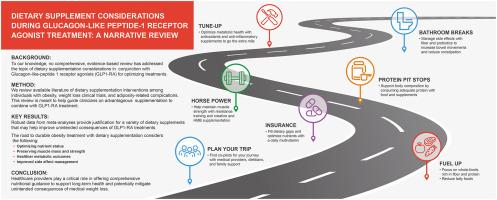Dietary supplement considerations during glucagon-like Peptide-1 receptor agonist treatment: A narrative review
引用次数: 0
Abstract
Background
Recent advancements with Glucagon-like Peptide-1 Receptor Agonists (GLP-1RA) result in approximately 15 % or more weight reduction. Scientific research addressing specific nutritional concerns with GLP-1RA are still emerging. While some guidelines currently exist for nutritional considerations, they are largely focused on side effect management and providing basic dietary guidance during GLP-1RA.
Methods
This narrative review aims to provide practical evidence-based considerations for dietary supplementation to help optimize health outcomes while using GLP-1RA. We reviewed available literature of dietary supplementation interventions among individuals with obesity, weight loss clinical trials, and adiposity-related complications to help guide clinicians on potentially advantageous supplementation.
Results
Robust data from meta-analyses provides justification for a variety of dietary supplements that can support the unintended consequences of GLP-1RA treatments. Multivitamins are recommended to address micronutrient insufficiencies as determined by individual deficiencies and suboptimal intake. Protein supplements can help individuals meet daily protein intake recommendations of 1.2–2.0 g/kg/d. When combined with resistance training, whey protein can help preserve lean body mass during weight loss, with additional strength benefits from creatine monohydrate and β-Hydroxy β-Methylbutyrate supplementation. Antioxidants and anti-inflammatory nutrients can mitigate oxidative stress and inflammation. Fiber and probiotics can improve bowel regularity and mitigate side effects.
Conclusion
Healthcare providers play an active role in supporting their patients with comprehensive obesity treatment. Guidance should focus on improving their long-term health and potentially mitigating unintended consequences. Optimizing nutrient intakes with therapeutic doses of dietary supplements may enhance outcomes when used alongside GLP-1RA, such as increasing nutrient status, retaining lean mass, reducing oxidative stress and inflammation, and improving gastrointestinal health.

胰高血糖素样肽-1受体激动剂治疗期间膳食补充剂的考虑:叙述性回顾
胰高血糖素样肽-1受体激动剂(GLP-1RA)的最新进展导致大约15%或更多的体重减轻。与GLP-1RA有关的特定营养问题的科学研究仍在兴起。虽然目前存在一些营养方面的指南,但它们主要集中在副作用管理和提供GLP-1RA期间的基本饮食指导。方法本综述旨在为膳食补充剂提供实用的循证考虑,以帮助在使用GLP-1RA时优化健康结果。我们回顾了现有的关于膳食补充剂干预肥胖个体、减肥临床试验和肥胖相关并发症的文献,以帮助指导临床医生选择可能有利的补充剂。结果来自荟萃分析的可靠数据为各种膳食补充剂提供了理由,这些膳食补充剂可以支持GLP-1RA治疗的意外后果。多种维生素被推荐用于解决由个体缺乏和次优摄入量决定的微量营养素缺乏。蛋白质补充剂可以帮助个人达到每日蛋白质摄入量推荐值1.2-2.0 g/kg/d。当与阻力训练相结合时,乳清蛋白可以在减肥期间帮助保持瘦体重,并从肌酸一水和β-羟基β-甲基丁酸补充剂中获得额外的力量益处。抗氧化剂和抗炎营养素可以减轻氧化应激和炎症。纤维和益生菌可以改善肠道的规律性,减轻副作用。结论医护人员在支持患者进行肥胖综合治疗方面发挥着积极作用。指导应侧重于改善他们的长期健康和可能减轻意外后果。当与GLP-1RA一起使用时,优化营养摄入和治疗剂量的膳食补充剂可能会提高结果,如增加营养状况,保持瘦质量,减少氧化应激和炎症,改善胃肠道健康。
本文章由计算机程序翻译,如有差异,请以英文原文为准。
求助全文
约1分钟内获得全文
求助全文

 求助内容:
求助内容: 应助结果提醒方式:
应助结果提醒方式:


